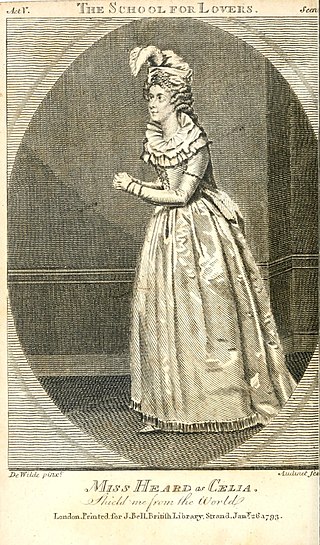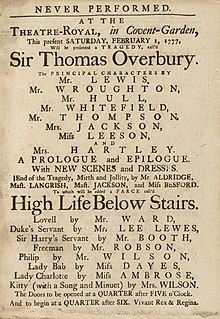The Natural Son is a comedy play by the British writer Richard Cumberland. It was first staged at the Drury Lane Theatre in London in December 1784. The play is notable for the return of the popular character Major O'Flaherty from Cumberland's 1771 play The West Indian.
The Battle of Hastings is a 1778 play by the English writer Richard Cumberland. It is a tragedy set around the Battle of Hastings in 1066. It was staged at the Drury Lane Theatre in October 1778 by Richard Brinsley Sheridan. Sheridan later mocked Cumberland's sensitivity to criticism by modelling the character Sir Fretful Plagiary, in his 1779 play The Critic, after him.
A Word to the Wise is a 1770 comedy play by the Irish writer Hugh Kelly. It was his second work after the 1767 hit False Delicacy. Kelly was known as a supporter of the government, and an opponent of the radical John Wilkes. During the second performance of the play a riot broke out amongst Wilkes' supporters at the Drury Lane Theatre and the play was subsequently withdrawn. When it was published instead Kelly wrote a long introduction defending himself and complaining about political prejudice. It was the first play performed at The Theatre, Leeds when it was opened on 24 May 1771. It was later staged by the American Company in North America.
Busiris, King of Egypt is a 1719 tragedy by the British writer Edward Young. It is set in Ancient Egypt during the reign of Busiris. It was considered a success, enjoying a good run and was subsequently published by Jacob Tonson. The work was dedicated to the Duke of Newcastle who as Lord Chamberlain oversaw the theatres.
The Revenge is a 1721 tragedy by the British writer Edward Young, set in 16th-century Spain. Although initially it did not enjoy the same success as his previous play Busiris, King of Egypt, it later became a much-revived work during the eighteenth century particularly popular because of the Othello-like role of the Moorish character Zanga. John Philip Kemble revived the work briefly in 1798 before Edmund Kean in 1815 did so with great success and it became part of his repertoire.
Elmerick, or Justice Triumphant is a 1740 tragedy by the British writer George Lillo. It was performed posthumously following his death the year before. It portrays the assassination of Gertrude of Merania, the consort of Andrew II of Hungary, and the play is part of the so-called Bánk bán tradition.
Art and Nature is a 1738 comedy play by the British writer James Miller. The play received a rough reception from what Miller described a "faction" in the Drury Lane audience, and its run was not extended beyond a single night. He described its subsequent publication as an attempt to vindicate himself.
The Coffee House is a 1738 comedy play by the British writer James Miller, written as an afterpiece. After being performed at Drury Lane, it was published later that year with some alterations to the play's original text.
Agamemnon is a 1738 tragedy by the British writer James Thomson. It is based on the story of Agamemnon from Greek Mythology.

The Way to Keep Him is a 1760 comedy play by the Irish writer Arthur Murphy. Originally three-acts in length, it premiered at the Drury Lane Theatre in a double bill with Murphy's The Desert Island. Actor-manager David Garrick appeared in both productions. A great success, the following year it was extended to five acts, with music composed by Thomas Arne to accompany it. It had many revivals well into the nineteenth century.
The Double Mistake is a 1766 comedy play by the British writer Elizabeth Griffith. It was her most successful play along with The School for Rakes.
The Roman Father is a 1750 tragedy by the British writer William Whitehead. It is set during the reign of Tullus Hostilius, the legendary third King of Rome and his war with the neighbouring city of Alba Longa.
Creusa, Queen of Athens is a 1754 tragedy by the British writer William Whitehead. It is based on the story of Creusa of Athens.

The School for Lovers is a 1762 comedy play by the British writer William Whitehead.
The Foundling is a 1748 comedy by the British writer Edward Moore.
Gil Blas is a 1751 comedy play by the British writer Edward Moore. It is based on the novel Gil Blas by French writer Alain-René Lesage.
The School for Rakes is a 1769 comedy play by the British writer Elizabeth Griffith. It was inspired by the 1767 French play Eugénie by Pierre Beaumarchais.
The Triumphs of Love and Honour is a 1731 tragedy by the British writer Thomas Cooke.
Love the Cause and Cure of Grief is a 1743 tragedy by the British writer Thomas Cooke. It is a revised version of Cooke's earlier published but unperformed play The Mournful Nuptials.
The Non-Juror is a 1717 comedy play by the British writer Colley Cibber. It is inspired by Molière's 1664 work Tartuffe.


